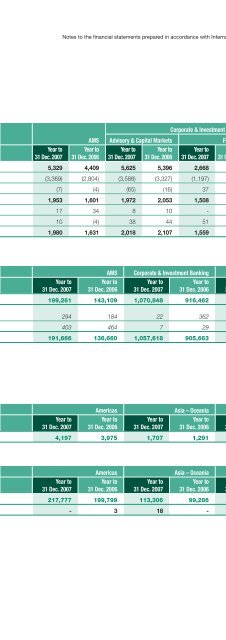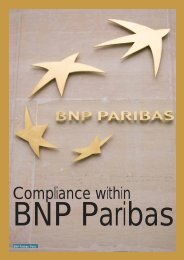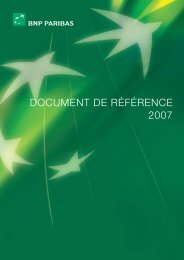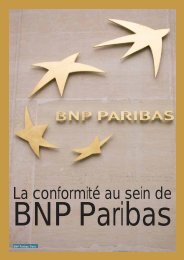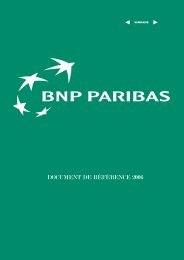2007 REGISTRATION DOCUMENT
2007 REGISTRATION DOCUMENT
2007 REGISTRATION DOCUMENT
- No tags were found...
You also want an ePaper? Increase the reach of your titles
YUMPU automatically turns print PDFs into web optimized ePapers that Google loves.
8 FoundingGENERAL INFORMATIONdocuments and a rticles of a ssociation< Contents >with the provisions of articles L. 225-38 to L. 225-43 of the Frenchcommercial code (Code de Commerce). The Board may also authorise thereimbursement of travel and business expenses and any other expensesincurred by the directors in the interests of the Company.Section IVDuties of the Board of Directors, the Chairman,the Executive Management and the Non-VotingDirectors (Censeurs)Article 12The Board of directors shall determine the business strategy of BNPParibas and supervise the implementation thereof. Subject to the powersexpressly conferred upon the Shareholders’ meetings and within the limitof the corporate purpose, the Board shall handle any issue concerningthe smooth running of BNP Paribas and settle matters concerning theCompany pursuant to its deliberations. The Board of directors shallreceive from the Chairman or the Chief Executive Officer all of thedocuments and information required to fulfil its duties.The Board of directors’ decisions shall be executed by either the Chairman,the Chief Executive Officer or the Chief Operating Officers, or by anyspecial representative appointed by the Board.At the proposal of the Chairman, the Board of directors may decide toset up committees responsible for performing specific tasks.Article 13The Chairman shall organise and manage the work of the Board ofdirectors and report thereon to the shareholders’ meeting. The Chairmanshall also oversee the smooth running of BNP Paribas’s managementbodies and ensure, in particular, that the directors are in a position tofulfil their duties.The remuneration of the Chairman of the Board shall be freely determinedby the Board of directors.Article 14The Board of directors shall decide how to organize the executivemanagement of the Company. The executive management of theCompany shall be ensured under his own liability either by the Chairmanof the Board of directors or by another individual appointed by the Boardof directors and bearing the title of Chief Executive Officer.Shareholders and third parties shall be informed of this choice inaccordance with the regulatory provisions in force.The Board of directors shall have the right to decide that this choice befor a fixed term.In the event that the Board of directors decides that the ExecutiveManagement shall be ensured by the Chairman of the Board, theprovisions of these articles of association concerning the Chief ExecutiveOfficer shall apply to the Chairman of the Board of directors who willin such case assume the title of Chairman and Chief Executive Officer.He shall be deemed to have automatically resigned at the close of theShareholders’ meeting held to approve the financial statements for theyear in which he reaches sixty-five years of age.In the event that the Board of directors decides that such duties shouldbe separated, the Chairman shall be deemed to have automaticallyresigned at the close of the Shareholders’ meeting held to approvethe financial statements for the year in which he reaches sixty-eightyears of age. However, the Board may decide to extend the term ofoffice of the Chairman of the Board until the close of the Shareholders’meeting held to approve the financial statements for the year in whichhe reaches sixty-nine years of age. The Chief Executive Officer shall bedeemed to have automatically resigned at the close of the Shareholders’meeting held to approve the financial statements for the year in whichhe reaches sixty-three years of age. However, the Board may decide toextend the term of office of the Chief Executive Officer until the closeof the Shareholders’ meeting held to approve the financial statementsfor the year in which he reaches sixty-four years of age.Article 15The Chief Executive Officer shall be vested with the broadest powers toact in all circumstances in the name of BNP Paribas. He shall exercisethese powers within the limit of the corporate purpose and subject tothose powers expressly granted by French law to Shareholders’ meetingsand the Board of directors.He shall represent BNP Paribas in its dealings with third parties. BNPParibas shall be bound by the actions of the Chief Executive Officer evenif such actions are beyond the scope of the corporate purpose, unless BNPParibas can prove that the third party knew that the action concernedwas beyond the scope of the corporate purpose or had constructiveknowledge thereof in view of the circumstances. The publication of theCompany’s articles of association alone shall not constitute such proof.The Chief Executive Officer shall be responsible for the organisation andprocedures of internal control and for all information required by Frenchlaw regarding the internal control report.The Board of directors may limit the powers of the Chief Executive Officer,but such limits shall not be valid against claims by third parties.The Chief Executive Officer may delegate partial powers, on a temporaryor permanent basis, to as many persons as he sees fit, with or withoutthe option of redelegation.The remuneration of the Chief Executive Officer shall be freely determinedby the Board of directors.The Chief Executive Officer may be removed from office by the Board ofdirectors at any time. Damages may be payable to the Chief ExecutiveOfficer if he is unfairly removed from office, except where the ChiefExecutive Officer is also the Chairman of the Board of directors.In the event that the Chief Executive Officer is a director, the term ofhis office as Chief Executive Officer shall not exceed that of his termof office as a director.Article 16At the proposal of the Chief Executive Officer, the Board of directors may,within the limits of French law, appoint one or more individuals, called ChiefOperating Officers, responsible for assisting the Chief Executive Officer.In agreement with the Chief Executive Officer, the Board of directorsshall determine the scope and term of the powers granted to the ChiefOperating Officers. However, as far as third parties are concerned,the Chief Operating Officers shall have the same powers as the ChiefExecutive Officer.When the Chief Executive Officer ceases to perform his duties or isprevented from doing so, the Chief Operating Officers shall, unlessthe Board of directors decides otherwise, retain their positions andresponsibilities until a new Chief Executive Officer is appointed.The remuneration of the Chief Operating Officers shall be freelydetermined by the Board of directors, at the proposal of the ChiefExecutive Officer.The Chief Operating Officers may be removed from office by the Boardof directors at any time, at the proposal of the Chief Executive Officer.Damages may be payable to the Chief Operating Officers if they areunfairly removed from office.1234567891011270<strong>2007</strong> Registration document - BNP PARIBAS


